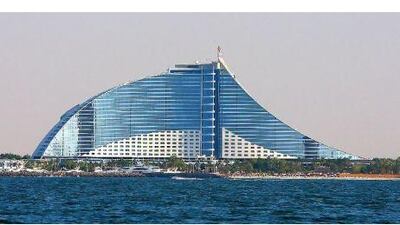The Swiss investment bank Credit Suisse has produced the latest estimate of Dubai's total indebtedness in a detailed report on the emirate's financial and economic prospects.
The lender believes, however, that after a year of restructuring at the emirate's two biggest debtors, Dubai World and Dubai Holding, fears over potential defaults are receding, and it says the UAE's well-capitalised banks will be able to absorb any major hit from provisioning requirements.
But "there is a chance of further restructuring of debt", it adds.
"We estimate the total debt of entities ultimately controlled [50 per cent stake or more] by Dubai government and Sheikh Mohammed bin Rashid to be no less than $129.3 billion [Dh474.9bn]," the banking group said.
"The amount comprises publicly disclosed debt [US$111.1bn, or Dh408.07bn] and debt on which disclosure is limited. However, we think that the debt burden could be much higher than our final numbers owing to lack of full disclosure," the report said.
The amount is higher than the last estimate by the IMF, which put total debt at $109bn, and also higher than several recent studies by other investment bank analysts.
The biggest part of the debt burden remains with Dubai World, Credit Suisse says, with an estimated $50.2bn attributable to the conglomerate.
Another big chunk is the sovereign debt of $28.9bn owed to investors, including the $20bn provided by the Abu Dhabi Government and the Central Bank in bond issues.
Dubai Holding, currently being restructured, and the Investment Corporation of Dubai account for most of the balance with combined debts of $46bn.
Dubai World, which is on the verge of signing off a restructuring deal with 90 financial creditors involving some $24.9bn of debt, faces a "substantially tight" repayment schedule. It has to repay a total of $13.6bn over the next two years, said the Credit Suisse report.
Dubai entities face combined repayment bills of $17.5bn this year and $17bn next, the lender estimates.
Dubai Holding debt is estimated at $13.4bn, slightly higher than existing estimates, with maturities spread over the next eight years. "This suggests to us it makes sense for Dubai Holding (or its subsidiaries) to target a reschedule of debt maturities beyond 2018," Credit Suisse said.
It added that the value of the assets held by Dubai Holding - such as the Jumeirah hotel and leisure group and the TECOM business parks and free zones, as well as investment assets held by Dubai International Capital - "is equal to or exceeds the total debt".
Of the Investment Corporation of Dubai (ICD) - considered by many to be the strongest part of Dubai Inc with solid assets such as Emirates Airline and Dubai Aluminium - the Credit Suisse report concluded: "ICD's total debt stands at around $24bn, according to our research. A major part of the liabilities ($11.1bn) fall due in 2011-2012, which poses a medium-term liquidity risk, with 2012 being a particular challenge as $6bn will have to be repaid.
"ICD has a $6bn loan facility, of which $4bn matures in 2012 and another $2bn in 2013. Similar to the situation around Dubai Holding and Dubai International Capital, we expect ICD to roll over the debt to extend the maturities to 2014 and beyond," it added.
ICD's liabilities are covered by assets, Credit Suisse said.
Apart from debts of companies in the three main arms of Dubai Inc, Credit Suisse also identifies some $8.4bn of liabilities from other government-related companies, such as the Dubai International Financial Centre, ports and free-zone authorities, and Dubai Aerospace Enterprise.
Credit Suisse said it forecast continued downward pressure on prices after a fall of almost 50 per cent in some areas since mid-2008, because of oversupply in commercial and residential property, worsening market expectations, low volumes of land transactions and poor availability of mortgage credit.

